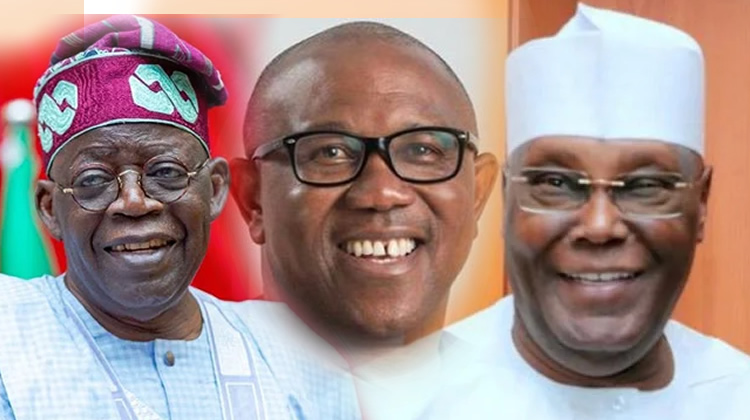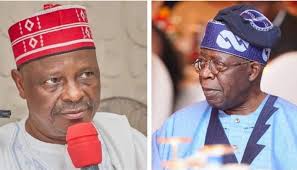
Tinubu’s victory: Atiku, Obi file 86-ground appeals at S’Court
Barely two weeks after the Presidential Election Petition Tribunal affirmed the victory of President Bola Tinubu in the February 25 polls, the presidential candidates of the Peoples Democratic Party and Labour Party, Atiku Abubakar and Peter Obi, have filed 86 grounds of appeal at the Supreme Court to nullify the judgment.
The two candidates in separate appeals filed on Tuesday, asked the apex court to set aside the PEPT ruling and nullify Tinubu’s election, describing the verdict as erroneous.
Atiku’s appeal was hinged on 35 grounds in which he faulted the tribunal’s ruling on electronic transmission of results, Federal Capital Territory votes, and other key planks.
Obi, on the other hand, faulted the September 6 judgment on 51 grounds.
The PEPT led by Justice Haruna Tsammani had in a unanimous decision held that Atiku and Obi as well as other petitioners failed to substantiate their allegations against the poll conducted by the Independent National Electoral Commission.
The justices stated that the documentary and oral evidence presented before them could not prove the claims of irregularities, corrupt practices, non-compliance with the electoral guidelines, and other allegations for which the petitioners had asked the court to void Tinubu’s election.
Atiku, who came second in the poll, had prayed the court to void Tinubu’s election and declare him as the authentic winner of the poll and Obi on the other hand, also said he was the rightful winner of the polls despite coming third in the exercise.
In the Notice of Appeal dated September 18, and filed by his lead counsel, Chief Chris Uche, SAN, the former Vice President, sought the nod of the apex court to allow the appeal and set aside the judgment of the lower court.
Atiku’s appeal
Atiku and the PDP are also asking the Supreme Court to determine that Tinubu was not duly elected by a majority of votes cast in the election and therefore,’’ the declaration and return of the 2nd respondent (Tinubu) by the 1st respondent (INEC) as the winner of the presidential election conducted on February 25, 2023 is unlawful, wrongful, unconstitutional, undue , null and void and of no effect whatsoever.’’
The appellants further want the court to determine that the 2nd respondent was at the time of the election not qualified to contest the said election.
They are also praying the court to declare that Atiku, the 1st appellant, ‘’having scored the majority of lawful votes cast in the presidential election, be returned as the winner of the said election and be sworn in as the duly elected President of the Federal Republic of Nigeria.’’
In the alternative, the PDP flag bearer is seeking an order directing the electoral commission to conduct a run-off between him and Tinubu.
In the ground one of the appeal, Atiku held that the tribunal erred by refusing to uphold his argument on the compulsory electronic transmission of results as contained in the Electoral Act, 2022.
Citing page 678 of the judgment, he stated, ‘’The lower court erred in law when it refused to uphold the mandatoriness of electronic transmission of results for confirmation and verification of final results introduced by the Electoral Act 2O22 for transparency and integrity of results in accordance with the principles of the Act.’’
Atiku insisted that the Electoral Act introduced technology in the conduct of elections, particularly in the transmission and collation of results, being part of the election process easily susceptible to manipulation and compromise.
“Failure to comply with the said prescription of electronic transmission of the result of the said election in the polling units by the Presiding Officers amounts to non-compliance with the provisions of section 60(5), section 64(4), and (5) of the Electoral Act,2022 which requires the transfer of the results of the election in the polling units by the Presiding officers in the manner prescribed by INEC,” he added.
The appellant further averred that the PEPT erred in law when despite the clear provisions of the enabling statutes, namely the Constitution of the Federal Republic of Nigeria 1999 (as amended), the Electoral Act 2022, the Regulations and Guidelines for the Conduct of Election, and the election manual, it held that the requirement of electronic transmission of the result of the election directly from the polling units to the INEC collation system was not a requirement of the Electoral Act, 2022.
Atiku further insisted that the lower court erred in failing to hold that the non-use of electronically transmitted results by the 1st respondent’s collation officers and returning officers for the collation and verification of election results before announcement, constitutes non-compliance with the mandatory provisions of the Electoral Act,2022.
He also argued that the tribunal was wrong to shift the burden of proof to him, referencing page 644 of the judgment.
Atiku and the PDP equally submitted that the lower court erred in law when it failed to nullify the presidential election on the grounds of non-compliance with the Electoral Act 2022 ‘’when by evidence before the court, the 1st respondent conducted the election based on very grave and gross misrepresentation contrary to the principles of the Electoral Act 2022, based on the “doctrine of legitimate expectation.”
While pointing out that the Electoral Act 2022 made the use of Bi-modal Verification Accreditation System and INEC’s Results Viewing portals mandatory in the conduct of the 2023 general election, the appellants noted that INEC through its Chairman, Prof Yakubu Mahmoud, publicly gave guarantees, undertakings, clear and unambiguous representations to candidates and political parties that the polling units results were mandatorily required to be electronically transmitted or transferred directly by the presiding officers.
Atiku held that INEC conducted the said Presidential election based on ‘’the gross misrepresentation’’ to the appellants and the general voting public that the presiding officers were going to electronically transmit the results of the said election directly from the polling units to the 1st respondent’s collation system.
He added that “Contrary to the above unambiguous representations, undertakings, and guarantees, the 1st respondent neither deployed the electronic transmission of election results nor the electronic collation system in the said election, sabotaging the raison d’etre for the enactment of the new Electoral Act 2022 and the introduction of the technological innovations.
Public institutions
“Rather than hold the 1st respondent as a public institution accountable to the representations that it made pursuant to its statutory and constitutional duties which created a legitimate expectation on the part of the appellants, the lower court wrongly exonerated the 1st respondent of any responsibility by holding that the use of the technological innovations to guarantee transparency was not mandatory.”
The appellants also challenged the tribunal’s verdict on the 25 percent votes requirement in the Federal Capital Territory in grounds 9, 10, 11, and 12 of their 42-page appeal.
Specifically in ground 12, Atiku faulted the PEPT lower court for saying that in a Presidential election, polling one-quarter or 25 percent of total votes cast in the FCT was not a precondition for a candidate to be deemed as duly elected under section 734 of the Constitution.
Atiku challenged the decision of the tribunal to strike out his witnesses’ statements on oath.
Highlighting the particular errors made by the tribunal, Atiku said, “The witnesses’ statements on oath and the reports were products of the inspection conducted pursuant to the order of the court, and could not have been produced in advance before the filing of the petition; same being dependent on access to electoral documents in the possession of an adverse party.
“The PW 12, PW L3t PW L4, PW 15, PW 16, PW 17, PW 18, PW 23, PW 24, and PW 25 were presiding officers, being ad hoc staff of INEC who functioned at the polling units, who could only testify upon orders of subpoena, being staff of an adverse party, and could not have prepared witness statements on oath in advance before the filing of the petition.”
Atiku in ground 14 also held that the lower court erred in law when it held that Order 3, Rules 2 and 3 of the Federal High Court (Civil Procedure) Rules, 2019 permitting parties to file witness statements of subpoenaed witnesses after commencement of action did not apply to election petitions.
Regarding the court’s ruling that Tinubu was qualified to contest the presidential election, Atiku held that the grounds of qualification and disqualification to contest an election were circumscribed by the provisions of the Constitution and such grounds are exhaustive.
The appellants also maintained that the lower court was wrong to have dismissed the testimonies of their collation agents as hearsays, citing page 657 of the judgment.
On the decision of the court that the appellants dumped certain exhibits on the court without any witness linking them up with the specific complaint of non-compliance, Atiku and PDP averred that the lower court erred in law because ‘’it failed to give effect to section 137 of the Electoral Act 2022 which obviated the requirement of calling of oral evidence where the non-compliance is manifest on the face of the certified true copy of





